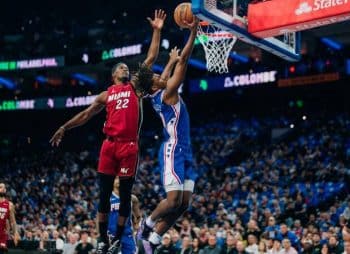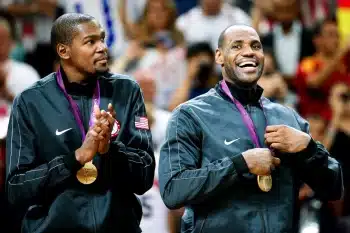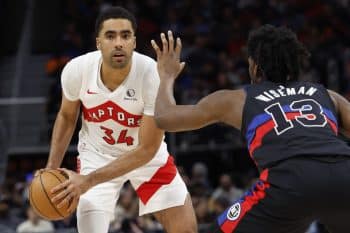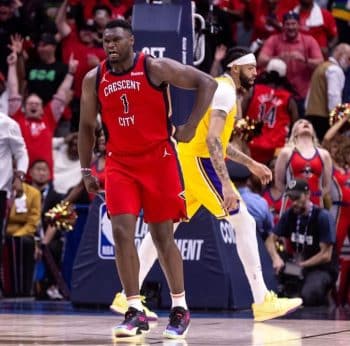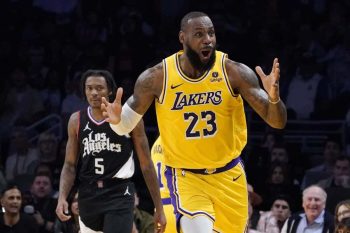NBA
NBA Daily: Frank Ntilikina Might Not Be The Future, But That Might Be Okay

The writing was on the wall from the time the Knicks traded for Emanuel Mudiay, and in the weeks since, it’s become more and more obvious that the New York Knicks don’t see Frank Ntilikina as their point guard of the future.
While it may sting to recall that Dennis Smith, Jr. and Donovan Mitchell were both on the board when the Knicks selected Ntilikina, the suggestion here would be to not declare the drafting of the Frenchman to be a mistake. Admittedly, that was suggested in this very space in the not so distant past.
Here’s why.
As we speak, the Knicks find themselves to be a team in transition. While it’s true that this designation can be used to apply to the team every year, the truth is that the hiring of Scott Perry once again was the hitting of the reset button in Gotham City.
Trading Carmelo Anthony was the first major step toward the teardown. In order to build things back up, the Knicks will need more much than Kristaps Porzingis. They’ll also need to add a lot more than Tim Hardaway, Jr.
In the end, if there’s one thing that the Golden State Warriors have taught us, it’s that it takes 10 to tango in the NBA today. Winning teams no longer follow a model where they are primarily built around one or two players and subpar supporting casts. Each of the NBA’s top teams are teams that have the franchise pillars surrounded by at least four other excellent contributors whose value far exceeds those of an average player of their position.
Just because Ntilikina might not be the second coming of Mark Jackson doesn’t mean that he can’t be one such player. So long as the physical tools are there, it’s not impossible to make the transition from point guard to shooting guard or vice versa. We’ve seen plenty of players do it, though with mixed results.
What got Ntilikina drafted so highly in the first place wasn’t the belief that he would be a 20-point per game scorer at the NBA level, it was the fact that he had a fairly rare combination of good point guard instincts and shooting guard size. From the beginning, he was considered to be a combination guard at the NBA level, though the admitted hope for the Knicks was that he would be the point guard of the future.
That Trey Burke and Mudiay each now have the opportunity to steal the distinction from Ntilikina shows the Knicks made a mistake in thinking that the 19-year-old would be their floor general, but not that he could still be an effective player for the team.
As a basketball culture, particularly when it comes to critiquing the draft picks of front offices, the propensity is to apply a narrow standard by simply comparing the player that was drafted to players to were drafted later in his class. If a player drafted after the drafted player goes on to prove to be the better pro, it doesn’t mean that the drafted player was a bad pick. He just happened to not be the best player in his class. And that’s okay, because no scout can ever say that he has always been able to correctly predict who each of his potential prospects would be in the future.
A fairly good example of the point can be found with the 2011 draft class.
Kyrie Irving was selected with the first overall pick, and after six full seasons, it’s fair to see that he was the best choice.
In total, the class featured six players who have gone on to be named an NBA All-Star, five of whom have also been named to an All-NBA Team.
Joining Irving on the list are Kemba Walker (ninth selection), Klay Thompson (11th selection), Kawhi Leonard (15th selection), Jimmy Butler (30th selection) and Isaiah Thomas (60th selection).
Aside from those six, though, in hindsight, we’ve since learned that the 2011 draft was absolutely loaded. Enes Kanter, Tristan Thompson, Jonas Valaniunas, Brandon Knight, Nikola Vucevic, Tobias Harris, Kenneth Faried, Nikola Mirotic and Reggie Jackson are some of the more talented players in the class.
In some order, Vucevic, Harris and Thompson would probably be considered the best players in the class, with Knight, Valanciunas, and Jackson getting some credit, as well.
Obviously, there were six grand slam picks, a few home runs and some base hits.
Although the grand slam pays bigger and more immediate dividends, the base hit still counts.
To suggest that Harris or Nikola Mirotic were “bad” picks because both were selected before Jimmy Butler applies a standard that only uses hindsight. The fair way to judge the performance of a talent evaluator is to sum up the total impact players that were drafted in the years where he was in control and simply determine his strikeout ratio.
Sure, it’s best to get the best prospect, but the best analogy to apply to that situation would be to give five farmers access to 60 different sets of apple seeds with the directive that they each sift through the options and choose the seeds that they believe will grow into the most fruitful tree.
Some farmers may have methodology that helps them more effectively gauge the potential of the seeds, but at the end of the day, the reliance will be on a predictive forecast.
Just because Tristan Thompson isn’t a better pro than Kawhi Leonard doesn’t actually mean that Thompson was a bad pick, he just wasn’t as good of a pick as Leonard.
For the Knicks, the same logic should be applied to the drafting of Ntilikina. When a player has “it,” it simply doesn’t take that long to recognize. Almost immediately, he will show you game-changing potential, and before long, it’ll become second nature.
After about 60 games, the flashes should have been clearly evident and the consistency should at least begin to show signs of coming around.
We just haven’t seen it from Ntilikina yet, and apparently, neither have the Knicks.
In the end, it doesn’t mean the Frenchman was a bad draft pick, it just means he wasn’t the best.
While the Knicks will certainly hope to maximize their extra base hits and have one or two grand slams, Ntilikina, at least to this point, can’t be considered to be a strikeout.
But for Scott Perry’s sake, he should hope that his first swing of the bat results in some runs being driven in, because, just like Ntilikina’s stint as the team’s point guard of the future, his tenure could be over in short order if he doesn’t pay some immediate dividends.
